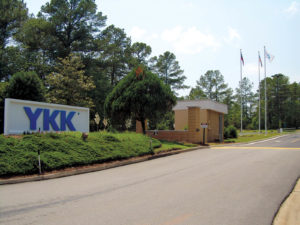
The YKK Group, headquartered in Tokyo, Japan, has implemented a bold and broad-based strategy for energy efficiency, reduced carbon output and sustainability. YKK’s green approach has substantially decreased the environmental impact of its 111 facilities operating in 73 countries and regions. But beyond the environmental benefits, these measures have also lowered operating costs, improved safety and enhanced quality of life within the communities where the company operates.
With an eye on the future, and recognizing the importance of environmental stewardship, former chairman and CEO Tadahiro Yoshida initiated the YKK Group Environmental Pledge in 1994. The pledge states: “The YKK Group proclaims that it will address and promote ‘harmony with the environment’ as the highest priority of its business activities.”
Company facilities across the globe have carried out the pledge’s stated mission. In addition, YKK companies in the U.S. launched an Environmental Compliance Committee. Composed of North American and Central American environmental managers, the committee convenes quarterly and its managers coordinate best operating practices for environmental and regulatory requirements.
According to Jim Spry, director of the engineering center in Macon, Ga., “One of the key functions [of the Environmental Compliance Committee] is to cross-audit one another. When someone has a problem, we share that information.”
By investing in new technology, the company consistently improves efficiency and reduces energy consumption. At the YKK zipper and fastener manufacturing facility in Macon, the company installed TREND, a system that monitors and controls electrical, water and gas consumption. Senior manager of facilities engineering Dustin Miller states, “Since we installed that back in 2015, we’ve reduced electrical consumption. Back then, we were around 48-million kilowatt hours per year, and now we’re down to in the low 40s.”
Electrical lighting also consumes a significant amount of energy at each of the YKK facilities, so the company has improved the efficiency of the lighting. “With a lot of plants, we’ve gone from T-12s to T-8s to T5s [fluorescent light fixtures] in some cases,” says Spry. “Now the big thing is going to LED lighting. Street lights, parking lot lights and outside building lights are all LED at this facility [in Macon].”
As a global manufacturer of zippers, hook and loop, plastic buckles and notions, webbing and snaps and buttons, the company stores, uses and disposes of a variety of chemicals. “We’ve implemented a solvent recovery system,” Spry says. “It allows us to recover the solvents themselves and reuse them, which reduces our chemical costs and the amount of solvents we are purchasing. But more importantly, it reduces the hazardous waste stream.”
Recycling solid parts and material is also a priority at the YKK plants in the North American region and throughout the world. “If you look at the North and Central America (NCA) region or YKK as a whole, recycling is big in every facility and it’s something that we track and report on. Here in the NCA, the lowest plant is probably around 73 percent recycling rate, and some plants go as high 90 to 95 percent.”
With its multi-faceted approach to energy efficiency, environmental stewardship, and sustainable practices, YKK is well positioned to respond to rising efficiency standards and more stringent regulations in the future.
Paul Johnson is a writer based in Minnesota.
 TEXTILES.ORG
TEXTILES.ORG


